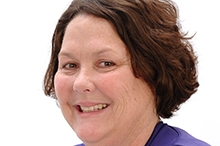Remember the ME in Medicine

I am fascinated by precision medicine, both personally and professionally. As Americans, we want the best in healthcare, and we have many examples of great healthcare happening around us. Traditionally, though, the focus has been on the providers of care, such as doctors, nurses, and hospitals. With precision medicine, there is great potential to shift the focus of care to each individual, rather than through a lens of the “average” patient.
I’ve spent my entire career working in healthcare, both as a nurse, and then building and implementing electronic health records for doctors and hospitals. When my daughter Morgan was diagnosed with a rare disease called Juvenile Dermatomyositis at 11 years old, I learned firsthand just how fragmented and provider-centric the healthcare system actually is. She went from being a competitive gymnast with award-winning tumbling to a very sick girl who had trouble walking up the stairs or riding her bike down the street.
After over a year of unexplained symptoms, we finally found a diagnosis. It was the most terrifying day of my life when the doctor told me with tears in her eyes that my child had a life-threatening illness. The doctor gave me the “average patient” education that left us with a lot of questions and waiting three months to see a specialist. Fortunately, that very night, I discovered a non-profit organization called Cure JM where parents of children with JM gave me the names and emails of doctors who specialized in JM as well as important advice on how to survive until our first appointment which was weeks away.
This new chapter in my life ignited my passion for individualized care. Morgan went from a single pediatrician, to 12 different healthcare providers at six different health systems. She currently has 9 different patient portals, each with their own version of her medical information, their own user name, password, and URL to remember. It wasn’t long into our journey when it hit me: How can her team of providers possibly understand her healthcare story if they only have access to a tiny piece of it?
As a co-founder of CareSync, I am proud of the work we have done to make patients individuals in the health system. By removing technology hurdles, portal logins, outdated information, and providing the patient with a place where they own their health information in a way that is collaborative, we have seen individualized results happen. Patients who were very sick are now feeling much better because the information helped them get a diagnosis that they were desperately seeking or because they are no longer taking medications that shouldn’t have been prescribed together. By connecting family members, patients, providers, dieticians, physical therapists, school nurses, and other providers together with the patient at the center of their care, errors have been corrected, and unnecessary tests, procedures, and hospitalizations have been avoided. These amazing accomplishments came simply by fostering knowledge and collaboration, and by giving people the power and encouragement to access their health information, and the ability to share it with those who need it.
My challenge to our entire healthcare system, and especially the innovators looking to make it better, put the patient in the center. Break up the silos of information that prevent individualized medicine to take root and grow into something beautiful. Combine the data, all of it, including genetics, medical records information, patient-generated data, with the collaborative, innovative minds of Americans who will create amazing discoveries to improve healthcare. It’s the American way, and it is time that we, since we’re all patients, demand it in healthcare.
Amy Gleason is the Chief Operating Officer at CareSync and the Vice President of Research for the Cure JM Foundation. She lives in Tampa, FL.
White House Blogs
- The White House Blog
- Middle Class Task Force
- Council of Economic Advisers
- Council on Environmental Quality
- Council on Women and Girls
- Office of Intergovernmental Affairs
- Office of Management and Budget
- Office of Public Engagement
- Office of Science & Tech Policy
- Office of Urban Affairs
- Open Government
- Faith and Neighborhood Partnerships
- Social Innovation and Civic Participation
- US Trade Representative
- Office National Drug Control Policy
categories
- AIDS Policy
- Alaska
- Blueprint for an America Built to Last
- Budget
- Civil Rights
- Defense
- Disabilities
- Economy
- Education
- Energy and Environment
- Equal Pay
- Ethics
- Faith Based
- Fiscal Responsibility
- Foreign Policy
- Grab Bag
- Health Care
- Homeland Security
- Immigration
- Innovation Fellows
- Inside the White House
- Middle Class Security
- Open Government
- Poverty
- Rural
- Seniors and Social Security
- Service
- Social Innovation
- State of the Union
- Taxes
- Technology
- Urban Policy
- Veterans
- Violence Prevention
- White House Internships
- Women
- Working Families
- Additional Issues

